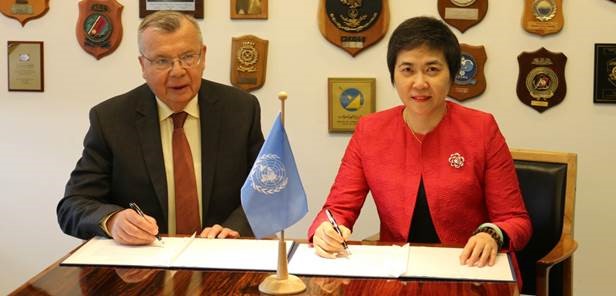Montréal and London, 2 May 2018 – ICAO Secretary General, Dr. Fang Liu, and the Executive Director of the United Nations Office on Drugs and Crime (UNODC), Mr. Yury Fedotov, took an important step today to bolster global efforts targeting international terrorism and transnational crime.
The two leaders met in London to sign a new Memorandum of Understanding (MoU) which will now greatly enhance their cooperation and information sharing on security priorities relating to border control, law enforcement, and criminal justice.

“One of the main priorities to be achieved through this MoU is to improve the scope and effectiveness of current responses safeguarding aviation against terrorism and acts of unlawful interference, illicit trafficking, and other security threats,” explained ICAO Secretary General Liu, who was accompanied throughout her London mission by Mr. Sylvain Lefoyer, ICAO Deputy Director of Aviation Security and Facilitation.
“To do so, it’s essential that ICAO and the UNODC promote a more widespread culture of collective responsibility and effective, collaborative responses to these types of threats, while at the same time continuing to simplify and streamline travel clearances for our network’s vast majority of legitimate passengers,” she emphasized.
“The partnership between UNODC and ICAO can help to strengthen the capacities of law enforcement agencies, working at airports in source, transit and destination countries, to detect and intercept drugs, illicit goods and criminals,” noted Mr. Fedotov. “This is vital as traffickers and high-risk passengers seek to exploit new transportation modes for criminal activities, and ever-increasing passenger numbers and growing connectivity present new challenges in countering the shipment of drugs and other illegal goods, whether on passengers, in luggage, through air cargo, by private aircraft or by parcel post and express.”
The new ICAO-UNODC MoU will build upon past cooperation initiatives between the two UN agencies, which have been working very closely and successfully together under the aegis of the UN Counter Terrorism Committee to develop the Advanced Passenger Information (API) programme and related guidelines. ICAO sets the international standards for API, and the programme also has practical implications for the UNODC’s Airport Communication Project (AIRCOP), which is pursued in partnership with World Custom Organization (WCO) and the International Police Organization (INTERPOL).
The new agreement is expected to bolster the agencies’ efforts to respond in a coordinated way to new and emerging challenges, such as evolving security requirements and increased international mobility. It also recognizes their shared priorities towards more sustainable travel facilitation solutions, including travel document security, citizen identity management, and the international standardization of passenger data exchange.
About ICAO
A specialized agency of the United Nations, ICAO was created in 1944 to promote the safe and orderly development of international civil aviation throughout the world. It sets standards and regulations necessary for aviation safety, security, efficiency, capacity and environmental protection, amongst many other priorities. The Organization serves as the forum for cooperation in all fields of civil aviation among its 192 Member States.
ICAO’s Security and Facilitation Strategic Objective
ICAO’s No Country Left Behind initiative
